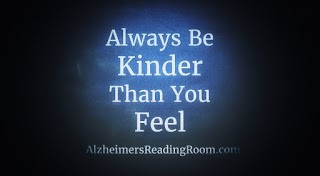Hello Daughterly Care Carers and the families of our clients living with a dementia diagnosis,
Happy New Year

Let’s make 2018 a great year for us all and to that end I would like to introduce to you, Bob De Marco – the loving son of Dotty, who had Alzheimer’s disease.
Bob is an American son who gave up work to care for his elderly mother on a full time basis and shared his experience with the world via his daily blogging. His Alzheimer’s Reading Room is one of the most read blogs about dementia and it is full of practical advice.
This blog has been re-published here with Bob’s permission and at the end there is a link to his original blog. Please forgive his American spelling and his blunt and politically incorrect terms like “nutty behaviour”.
This article is well worth reading and if the advice is applied, it will reduce primary carer stress.
How I Stopped My Mother from Being Mean to Me
Alzheimer’s caregivers often feel enormous stress when their Loved One is mean to them; or engages in difficult behaviours that are hard to understand and accept.
Does this person look mean to you?
The list of difficult behaviors that Alzheimer’s patients express in the mid stage of the disease are long, and sometimes never ending.
It took me 3 years to figure out how to stop my mother from being mean to me. If you read this article and follow the links that explain how I did it, you can do the same thing in a couple of hours.
I couldn’t possibly list all of the mean and nutty behaviors my mother, Dotty engaged in those first few years of our life together with Alzheimer’s. The list is just too long.
For this article I am going to focus-in on one mean behavior: when my mother repeatedly told me to get out, she didn’t need me, and she could take care of herself.
I’ll start with a few words of advice to caregivers:
Many of you can probably imagine what it feels like when a person living with dementia tells you –
“I don’t need you, get out”.
Or, says something even worse than that.
So there I was. I had dropped out of the world to care for my elderly mother, 24 hours a day, 7 days a week, 3,112 days. Could she have said anything meaner, “I don’t need you, get out.”
It hurt.
These mean spirited episodes with my elderly mother went on for years before they stopped. However, I was never deterred by her mean spirited behavior because I made a decision from the very beginning – I am going to put a stop to this.
So I tried everything in the book. I tried being overly nice – didn’t work. I tried being overly positive – didn’t work. I tried explaining why she needed my help – didn’t work.
I told her if she didn’t start accepting my help she would end up in a “home” – that did not work. In fact, it made things much worse.
I tried everything I could think of doing – it did not work.
Finally, I threw the book away and started thinking. And then it happened.
I realised something had to change, and that something was me.
Pretty simple huh? Dotty wasn’t going to change so it was up to me to change. To change the entire dynamic of our relationship.
Shortly after my realization that I had to change, I invented a new place I first called Dotty’s World.
I started asking myself – why? Why does Dotty get so upset? What is happening that is making her upset? Is it me?
Yes, it was me. Okay, we had that out of the way. It was me.
Eventually I changed the name of our new world to Alzheimer’s World.
Alzheimer’s World was the place I would go to, to better understand Dotty and to better understand me.
At first, I found that it was difficult to change gears and get into Alzheimer’s World. So, I actually started taking a giant step to the left when I needed to enter Alzheimer’s World.
To be honest, I couldn’t get there without the step to the left. Just couldn’t.
Next, I started taking notes in a spiral notebook. Every time Dotty would get mean I would write down what was happening before these episodes.
One thing stood out. Every time I left Dotty alone, shortly thereafter, she would get mean.
“Get out, I don’t need you, I can take care of myself”.
It became obvious to me that I couldn’t leave Dotty alone. I couldn’t leave her alone for 30 minutes to go to the store. Or, for any other reason. This is pretty common in mid to later stage Alzheimer’s. A person who is deeply forgetful cannot be left alone.
Yes, there were other cataylsts to this mean spirited and often bizarre and crazy behavior.
For example, if I would tell Dotty you can’t do that. Or, if I would correct her and try to explain the errors in her thinking. Or, even if I would stop her from doing something.
Once I made it to Alzheimer’s World I started looking at the world from Dotty’s point of view.
I looked at the world from her eyes.
Pretty soon I realized that the things that Dotty would do seemed very normal to her. I just looked at her while she did them and pretty much kept my mouth shut.
Pretty quickly, almost overnight in fact, I accepted that the things Dotty did were normal in Alzheimer’s World. So, I stepped to the left to better understand. Amazingly, the amount of stress I was feeling diminished – it happened immediately.
In Alzheimer’s World instead of getting all bent out of shape, I found myself marveling at the things Dotty would do. The things that Alzheimer’s patients do are often fascinating. After all, their brain works differently than yours and mine. You have to start understanding the brain on Alzheimer’s.
Now to my first major point. When Dotty said,
“Get out, I don’t need you, I can take care of myself”
that is not what she meant. What she did mean is:
Don’t leave me alone, I’m scared, please don’t put me away in a home.
Yep, she was scared and, like it or not, I was the one causing the fear when I left her alone.
Simple solution, I stopped leaving her alone.
Once I realized that there was a very different meaning to Dotty’s words in Alzheimer’s World, I was able to develop better and better solutions to problems.
In this case, I didn’t leave Dotty alone. But that is not all that I did. When she said “get out”, instead of getting all bent out of shape and reacting back at her, I did the exact opposite. What did I do?
I smiled, walked over to her, put my arm around her, and calmly said, in a clear, low, confident voice,
I’m not going anywhere, we are here together now, and I am going to take care of you.
It took a while, but yes, it finally sunk into her brain.
Alzheimer’s World is wild, sometimes crazy, a backwards place. I learned that in Alzheimer’s World words from an Alzheimer’s patient are often a cry for help. Many times what an Alzheimer’s patient says is exactly the opposite of what they mean.
So I started meeting meanness with an equal and opposite reaction – kindness.
Kindness, compassion, and understanding.
This is how you learn to cope with Alzheimer’s. Understand, cope, communicate.
By the way, Dotty stopped telling me to get out.
The few times she did tell me to get out I actually laughed. This helped me to realize how far I had come as a caregiver. Instead of enormous stress, I felt calm and comfortable.
If you follow the links in this article you will learn many of the lessons I learned over several years. The good news, it won’t take you years, it won’t even take days.
Once you incorporate these ideas into your life you will find that many of the things that are driving you crazy are normal in Alzheimer’s World. The amount of stress you are feeling will be greatly diminished by your new understanding of your loved one.
Here is the best part. Your loved one will begin to cooperate. So instead of feeling like they are the enemy, you will start to become good friends.
The bottom line – it is up to you.
Wouldn’t you rather live a more happy life while caring? Wouldn’t you like to bring the highest quality of life possible to your loved one?
What do you think – was this blog helpful for you?
Leave a comment below, also perhaps you could share how you cope with being told to get out or other hurtful comments.

Kate Lambert
B.Ec F.Fin
Daughterly Care CEO & Co-Founder
Learn more from Bob:
Alzheimer’s Care, Acceptance, Recognition, Change, and Life
Communicating in Alzheimer’s World
Did You Know Dementia Patients Get Agitated When Left Alone?
The Importance of Touch and Kindness in Dementia Care
10 Things a Person Living with Dementia Would Tell You If They Could
Definitions:
Cope. To face and deal with responsibilities, problems, or difficulties in an effective and calm manner or way.
Coping requires us to make our own conscious effort to solve personal and interpersonal problems. This allows us to minimise stress, reduce conflict, and to better understand our situation.
Emotional super glue a bond that holds two people together and rises to a level that is so powerful, so all encompassing, that it can only be described in this way – you are bonded together by emotional super glue.
Caregiver or carer is a person who gives help and protection to someone who is sick or in need.
Empathy the ability to understand and share the feelings of another.
Compassion a feeling of deep sympathy and sorrow for another who is stricken by misfortune, accompanied by a strong desire to alleviate their suffering.
Dementia care is the art of looking after and providing for the needs of a person living with Alzheimer’s disease or a related dementia condition.
Flexibility the willingness to change or compromise.
Anger is a normal, sometimes healthy, human emotion. However, when it gets out of control and turns destructive, it can lead to a deterioration in personal relationships and a reduction in the quality of life.
Loneliness often occurs in Alzheimer’s disease and dementia care because our family and friends abandon us.
Bob DeMarco is the Founder of the Alzheimer’s Reading Room (ARR).
The Alzheimer’s Reading Room contains more than 5,000 articles and has been published daily since July, 2009.
Labels: alzheimers care , alzheimers meanness , alzheimers stress , coping with dementia , dementia care , dementia care at home , mean



Wow lispirational man with enormous insight into what it is to live in someone’s shoes!
Fantastic blog! Thanks for sharing!
Glad you enjoyed reading Bob’s blog ,Wendy. I find his blogs insightful and always learn something each time I read one.
Thank you! Very helpful. Just want to help Mum as much as possible to be calm and happy.
Thanks for your comment Trish. The best way to help your Mum be calm and happy is to discover the cause of any concerns she has and find solutions for each issue. In this case, Bob recognised that his Mum didn’t like being left alone. So he stopped leaving her alone when he ran errands, instead, he took his Mum with him. This, of course, requires time, patience & creativity.
Fantastic Blog. What Bob was doing without him realising was Montessori principles. By asking ‘Why’ is one of the core teachings of the Method. We call it the 3 W’s. The results speak for themselves. Truly amazing for him and his mum and truly amazing for Daughterly Care to be implementing the Montessori for Aged Care approach.
Thanks for leaving a comment Gina. Daughterly Care is really proud to be accrediting our community aged caregivers to be able to support our elderly clients using the structure of the Montessori for Aged Care approach. We are the first in Australia to do this for our community caregivers. Its already taking our exceptional Caregivers to a new level with positive outcomes for clients.
Thank you Kate, that blog held me to the end.
Beautifully presented
ann
Hi Kate
Your email in my long list of emails caught my attention straight away. I thought, maybe I need help? I found Bob’s article VERY helpful. Bob has great insight and this left me wanting to read on and on…
So thanks!!!
What a beautiful man to want to help his mother in her decline, and what an exceptional atypical reaction to choose to help her on her terms, not his own. That is the key to helping with dementia, it is all about the person living with dementia, not the carer. Walk a mile in their shoes.
Hi Rebecca, thank you for sharing your feedback.I am glad Bob’s blog was insightful. It is absolutely clear that he loves his Mother and he thinks about what she is really expressing – not just listening to the words she says. Kate
Hi Robin, yes Bob is a beautiful son to live with his Mother and support and care for her. He is a detective who looks for the true cause of the problem and then seeks a solution that works well for his Mum. Kate
The most helpful info is to remain calm. Your parent will not and can not chge. Answer that question for the 10th time if need be. Take a shirt walk to help clear your mind. The best thing I did was to purchase a small white erase board. Each visit I would begin to write the repetitive questions/answers on there and she would read it prior to her question. It is amazing. I also put reminders on it before I left that she would read until my next visit ( what day I would be back, her facility hair appt, etc) This is a great tool and kept her from asking those questions over and over. I would end the notes with a big I Love You. I also pray alot…lol